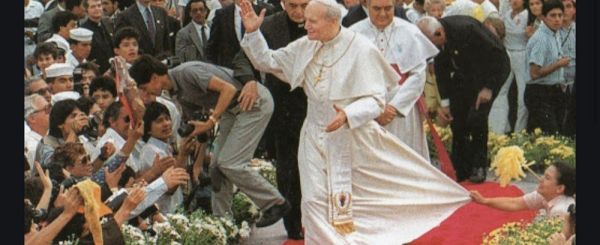This is the first time that the new Pope is speaking to you on the occasion of the World Day of Prayer for Vocations.
In the first place, let my and your affectionate and grateful remembrance go to the late Pope Paul VI. We are grateful, because during the Council he established this Day of prayer for all vocations to special consecration to God and the Church. We are grateful, because every year, for fifteen years, he highlighted this Day with his words as a Teacher, and encouraged us with his Pastor's heart.
Following his example, I now turn to you on this sixteenth World Day, to confide to you a number of things that I have very much at heart, almost like three passwords: pray, call, respond.
1. First of all, Pray. The reason why we must pray is certainly a big one, if Christ himself commanded us to do it: "Pray therefore the Lord of the harvest to send out labourers into his harvest" (Mt 9: 38). Let this Day be a public witness of faith and obedience to the Lord's command. So celebrate it in your Cathedrals: the Bishops together with the clergy, the men and women religious, the missionaries, those aspiring to the priesthood and the consecrated life, the people, the young people, many young people. Celebrate it in the parishes, communities, shrines, colleges and the places where there are people who are suffering. From every part of the world let this insistent prayer rise to heaven, to ask the Father what Christ wanted us to ask.
Let it be a Day full of hope. May it find us gathered together, as though in a worldwide Upper Room, "in continuous prayer, together with... Mary the Mother of Jesus (Acts 1:14), confidently awaiting the gifts of the Holy Spirit. In fact, on the altar of the Eucharistic Sacrifice, round which we gather in prayer, it is the same Christ who prays with us and for us, and assures us that we shall obtain what we ask for: "If two of you agree on earth about anything they ask, it will be done for them by my Father in heaven. For where two or three are gathered in my name, there am I in the midst of them" (Mt 18: 19 f). There are many of us gathered in his name, and we ask only for what he wants. In view of his solemn promise, how can we fail to pray with minds full of hope?
Let this Day be a centre of spiritual radiation. Let our prayer spread out and continue in the churches, communities, families, the hearts of the faithful, as though in an invisible monastery from which an unbroken invocation rises to the Lord.
[Pope John Paul II, Message for the 16th World Day for Vocations, 6 January 1979]












